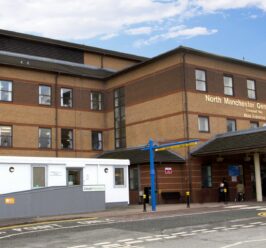
Hepatitis at North Manchester General Hospital
Viral Hepatitis
North Manchester General Hospital is home to one of the largest Hepatitis treatment centres in the UK, providing care for around 2500 patients living with Hepatitis B and treating over 600 people per year for Hepatitis C.
Our multi-disciplinary Viral Hepatitis service is predominantly focussed on providing specialised care for people diagnosed with Hepatitis B (including Hepatitis D) and Hepatitis C, through outpatient and community settings. We also work very closely with our colleagues in the HIV Specialist Nursing Team for those patients who also have HIV.
This page will give an overview of the team, information about Hepatitis B and C, and the treatments that we offer.
The NMGH Hepatitis Team:
The Hepatitis Team at North Manchester General Hospital deliver Hepatitis care in a number of different settings across Greater Manchester, and work in three areas:
General Hepatitis Care – providing a testing and treatment service for patients across Hospitals in the Greater Manchester Area including Emergency Departments. The Team also work within Drug and Alcohol Treatment Services in the area and GP Practices to deliver Hepatitis C treatment.
Community – service providing care for those with Hepatitis experiencing homelessness, which covers a range of drop-in centres, hostels, soup kitchens and other community settings across the Greater Manchester area.
Health and Justice – tests and treats for Hepatitis within prisons, probation service and approved premises. Micro-elimination status has been achieved and maintained within 4 prisons across Greater Manchester and our team provides a “complete testing service” with treatment within probation in order to support this disengaged population.
Information around Hepatitis B and C, including treatment available:
Hepatitis B
Hepatitis B is a viral infection that causes inflammation and scarring of the liver. This can be acute (short-term) or chronic (longer than 6 months). Those who have an acute infection may resolve the virus themselves but for some, this turns into a chronic (long-term) condition that requires lifelong monitoring. Most people will not need treatment initially but do require long term monitoring in case things change. Treatment may be required to prevent damage to the liver. This will be determined by blood tests taken either 6 monthly or annually. We will also do a fibro scan of your liver, which is a non-invasive scan that determines if there is any scarring of the liver.
If left unmonitored and untreated the hepatitis B virus can cause scarring to your liver which will lead to cirrhosis and increase the risk of hepatocellular carcinoma (HCC) or liver failure.
How is it transmitted?
Hepatitis B is transmitted through bodily fluids and through blood contact. The main routes of transmission are:
- Mother to baby at birth
- Unprotected sex
- Sharing injecting equipment for drugs (needles, spoons, w.000000000000000ater, notes to snort)
- Sharing razors, toothbrushes, nail and hair clippers
- Tattoos or piercings with non-sterile equipment
- Healthcare equipment that is re-used where healthcare services are not well-resourced
Treatment for Hepatitis B
There is currently no cure for hepatitis B but there are treatment options that suppress virus replication and prevent liver damage. The treatment options available are:
- Pegylated interferon (a weekly subcutaneous injection)
- Antiviral tablets
Your clinician or specialist nurse will be able to discuss the most appropriate treatment for your care.
We will then invite you to an initial assessment where we will take your history from you, take baseline blood to determine what treatment you will need and do a fibro scan to ascertain if there is any damage to your liver. You will be able to ask any questions you may have at this consultation.
Useful websites:
https://www.nhs.uk/conditions/hepatitis-b/
https://www.hepbpositive.org.uk/
Hepatitis C
Hepatitis C is a viral infection which is transmitted from blood to blood contact and can cause liver disease. Unlike Hepatitis B, hepatitis C can be cured with tablets taken for 8-12 weeks. The Hepatitis team delivers care mostly in community clinics, working collaboratively with drug and alcohol services, prison and probation services and the homeless and outreach programmes.
How is it transmitted?
Hepatitis C is transmitted through blood to blood contact the main route of transmission is from injecting drugs and the sharing of drug paraphernalia. Other risk factors include:
- Blood transfusions pre-1991
- Tattoos and piercings using non-sterile equipment.
- From mother to baby
- Through unprotected sex
- Sharing toothbrushes and hair clippers
- Healthcare equipment that is re-used where healthcare services are not well resourced.
Treatment for Hepatitis C
The current treatments for Hepatitis C are tablets called directly acting antivirals (DAAs). Taken as instructed they are 94-97% effective at curing Hepatitis C.
Our team will receive a referral from your GP or Drug Treatment Service. We will then invite you to an initial assessment where we will take a history from you, take baseline bloods to determine what treatment you will need and do a fibroscan to ascertain if there is any damage to your liver. You will be able to ask any questions you may have at this consultation.
Patients who attend the A&E departments at NMGH/MRI and Wythenshawe will be tested for Hepatitis C unless the patient opts out of this service.
There is no immunisation for hepatitis C currently, so even after treatment and cure, it is possible to catch it again if you are at risk.
Useful websites:
https://www.nhs.uk/conditions/hepatitis-c/
http://www.hepctrust.org.uk/support/uk-wide-support-groups
The NHS has a new testing service, allowing you to get easily and discreetly tested for Hepatitis C from the comfort of your own home: (hepctest.nhs.uk)
Team Members
Lead Hepatitis Specialist Nurses –Melissa Keating, Hayley Jones, and Pippa Murray
Hepatitis Specialist Nurse – Carla Dixon, Lynette Vilar Robinson, and Joanne Noble
Senior Specialist Support Worker – Lin Borkin and Sandra Bell
Community Liaison Officer – Paris Jones and Diane Kempton
Team PA – Dawn Tarry
Hepatitis Specialist Nurse NMP for Prisons – Marie White
Prison/Probation PA – Dawn Dean
Hepatitis C ODN Clinical Co-Chair: Dr Javier Vilar
Hepatitis C ODN Admin Manager NMGH – Susan Meagher
Hepatitis C ED Tracker – Mia Hughes
Senior Pharmacists – Sukhveer Singh and Liz Craig
Office hours –
Monday to Friday 08:00 – 17:00
Closed bank holidays and weekends
Telephone – 0161 918 4645 or 0161 922 3374

Viral Hepatitis at Wythenshawe
- Assessment and treatment for hepatitis B, C and D
- Outpatient viral hepatitis clinics
- Outreach to the South Base of the Manchester Substance Misuse Service (CGI)
- Home visits
Team
The Viral Hepatitis team at Wythenshawe consists of staff with extensive specialist knowledge of viral hepatitis.
Medical Team
- Dr G Calisti (Lead Consultant)
- Dr M Barrera (Consultant)
- Dr G Grana (Consultant)
- Dr R Bazaz (Consultant)
Clinical Nurse Specialists
- Smitha James (Lead Nurse)
Specialist Clinical Pharmacist
- Fiona Lynch
Referral
Inpatient referrals can be made via EPR to Infectious Diseases.
External referrals can be made using the choose and book system, or by electronic letter to idandnacadminteam@mft.nhs.uk
Contact
Telephone: 0161 291 4035
Smitha James – smitha.james2@mft.nhs.uk
The viral hepatitis infection clinics take place at Wythenshawe Hospital, in the North West Heart Centre located in the Yellow Zone near Entrance 6 or 7, off Southmoor Road.
Parking
The closest parking is in the main visitor car park, located in front of the Acute Block.

Consultants
- Dr Rohit Bazaz - Consultant Infectious Diseases
- Dr Giorgio Calisti - Consultant in Infectious Diseases & Clinical Lead
- Dr Gianluca Grana - Consultant Infectious Diseases
 In this section
In this section

